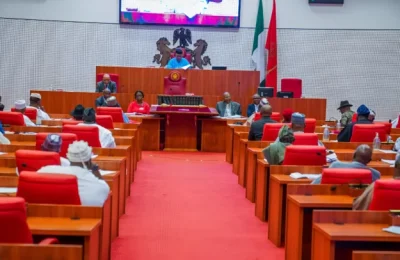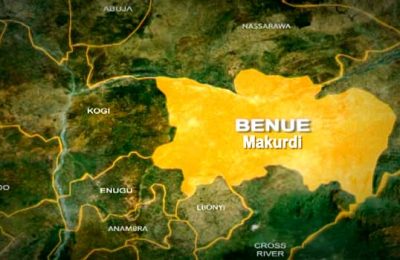

Olumuyiwa S. Adedeji, in his publication, A Decisive Moment in Nigeria: Fiscal Strategy, Policy Coordination, and Macroeconomic Stability, analyses the challenges the next administration will face in repositioning the country.
Despite the enthusiasm associated with political campaigns in Nigeria, the reality is that the next administration will have to contend with a nation facing significant fiscal-macroeconomic challenges.
This publication focuses on adopting a more integrated and comprehensive framework for the conduct of fiscal policy, with emphasis on improving domestic resource mobilisation, enhancing expenditure efficiency and exploring alternative sources of fiscal-deficit financing consistent with macroeconomic stability and growth. The note equally discusses the criticality of coordination between fiscal and monetary policy. The new administration has a major role to play in adopting a more encompassing fiscal framework and ensuring more effective policy coordination, including through limiting or eliminating the quasi-fiscal activities of the monetary authority and other agencies and establishing a fiscal and monetary coordination council.

The international financial institutions need to stand ready to assist the new administration in terms of additional financing, strategic technical assistance and reverting to considering intergenerational equity in their fiscal policy advice to Nigeria.
The truth is that Nigeria’s recovery from adverse economic and health shocks has been relatively weak. The period under consideration (2012-2022) was marked by the Ebola outbreak of 2014, the 2014-15 oil price shock and the subsequent volatility, the 2020 pandemic and the Russian invasion of Ukraine in 2022.
These adverse shocks impacted macroeconomic performance considerably.

The Nigerian government must be commended for its proactive actions, including a robust infection tracking system that helped to contain the health and macroeconomic impacts of the Ebola outbreak and the 2020 Coronavirus pandemic. The monetary and fiscal responses to the pandemic resulted in taking the economy out of recession. However, initial macroeconomic and structural conditions before the occurrence of these shocks combined with incomplete policy adjustment and inadequate economic coordination have somewhat contributed to the current economic challenges.

The limited economic coordination at the Federal Government level is impacting economic performance. The existence of various forms of quasi-fiscal activities makes it difficult to ascertain the level of aggregate demand at the policy design stage.
For example, the Central Bank of Nigeria (CBN) has been performing developmental functions through its various interventions and at the same time financing fiscal operations.
These sectoral interventions could eventually and potentially deliver on alleviating supply-side constraints.
Despite the usual excitement associated with political campaigns in Nigeria, the next administration will have to contend with a nation with deep-rooted macroeconomic problems.
The election campaign has commenced for the 2023 elections and some parties have released their economic blueprints. These blueprints need to be intensively interrogated by all Nigerians, laying the foundation for what has to be done differently in the next four years to take the country out of the current economic and social quagmire.
There are many issues that Nigeria’s policy makers are grappling with, but this thought piece focuses mainly on fiscal-related issues.
Fiscal policy is important for macroeconomic stability, economic prosperity and for re-building social contract.
ALSO READ FROM NIGERIAN TRIBUNE
This book covers a wide range of critical issues germane to achieving macroeconomic stability in Nigeria. It lays out current macroeconomic challenges in Nigeria and discusses the main global macroeconomic developments and potential implications for fiscal policy design and implementation.
It presents an assessment of the 2023 Federal Government budget and its consistency with the monetary policy stance. It is the fiscal component of political parties’ manifestos, highlighting the key issues that have to be addressed. It offers a roadmap for fiscal policy with a view to achieving macroeconomic stability and emphasises the criticality of policy coordination and institutional reform. The specific roles of international financial institutions (IFIs) in complementing the domestic reform agenda are discussed.
Recent data point to deepening macroeconomic challenges. The growth rate of the economy shows some resiliency, with real GDP growth averaging 3.3 percent during the first half of 2022. However, real GDP growth fell to 2.3 percent during the third quarter of 2022. Year-on-year inflation reached 21.1 percent in October, 2022 with food inflation at 23.7 percent. Based on the 2018/19 national monetary line, the poverty rate is about 40 percent. However, a recently released report indicates that 63 percent of the population is multidimensionally poor, taking into consideration health, education, living standards, work and shocks (NBS, 2022).
The last official statistics point to an unemployment rate of 33.3 percent. The gaps between the parallel market and official exchange rates have widened significantly, with the former currently at about N750 to $1 and the latter at N445 to $1 (investors and exporters’ FX window).
The CBN has been hamstrung in intervening in the foreign exchange market, as accretions to the Federation account through oil export proceeds have been limited as subsidy on refined petroleum products surged and oil production is at historical low.
The paradox of an oil-producing country experiencing less-favourable macroeconomic performance in the context of higher oil prices largely reflects lower oil production and higher fuel subsidies.
Oil prices have increased considerably in 2022 largely due to the Russia-Ukraine war. In this context, other oil-exporting countries have been experiencing improved macroeconomic performance in 2022 characterised by higher revenues, reduced fiscal deficits, appreciated exchange rates (for countries with flexible foreign exchange regimes) and higher external reserves.
In the case of Nigeria, however, the fiscal challenges have further deepened. Therefore, as the political process evolves, the current government needs to take additional fiscal measures to set the stage for the new administration.
Finally, it is important to note that the quality and strength of policy institutions matter in navigating a country through economic challenges.
- Adedeji is a non-resident fellow at the Center for Global Development and Founder/CEO of 4MNT (Economic Policy and Management Consulting). email: oadedeji@4mnt.com








